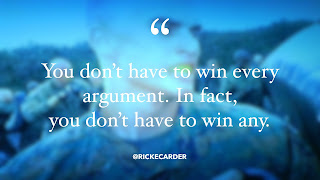Another day goes by as the clock ticks on-and-on. You find yourself shuffling the papers and re-organizing the table again. In my case, I have time to pen another article on my blog. There are slow times and a flood of contacts that are seemingly streaming passed your space. Yep, it is being a vendor at another conference in an exhibit hall.
Today I was thinking about ideas that I have found helpful while stewarding a display booth. There are at least three ideas that you too can use to develop relationships no matter what you are promoting. Even those most awkward cold turkey interactions can become your most engaged connections.
1. Be confident and engaged personally.
Think about this, as you are in your booth; if you are shy and held back from engaging others, you will likely make others feel as if they have to extend themselves to discover your goods and services. If they have to do all the work, they will probably walk passed you!
Demonstrate confidence as you extend yourself beyond the invisible boundaries. As you work to connect with people, you will need to remove as many barriers as you can. Starting with the booth table, push that barrier to the back of your display.
People who pass by your display are site-seeing and window shopping. If you are to gain connections, you will need to get their attention somehow! Being outgoing and confident is always essential for an effective outreach. For starters, you will need to break out of your discomforts and move into the space of other people comfort zones. You will need to create a friendly environment as quickly as possible.
2. Get out in-front and use friendly conversations.
This brings me to next point. You will need to get outside of your box. While it may be uncomfortable at first you will find ease the more you get out front of your booth. Don’t hide behind your display. Remove all the barriers in order to connect. Others are shy and need you to nudge them to engage.
You may even notice that as you stand in-front if your booth you will stand out from the other vendors. Many sit behind a table or display and look distracted. If you need to sit, order a tall chair and sit in front of your booth but stay engaged with people as they walk by you.
Use opening lines and eye contact t to draw people into conversations. You focus us on them at first! Later you can draw them into what you offer. By asking easy engaging questions you can find linkage to your goods and services. You are like a investigator discovering how to serve them further.
Try asking them softball questions like:
Where are you from?
What is your role at your organization?
How does this conference help you meet your goals?
What where you hoping to get out of this event?
These simple questions begins the more in-depth conversations leading to how you can serve them.
3. Define your strategy with multiple, re-engaging ideas that bring people back.
As you think about your booth, strategize ways that you can build engaging opportunities. You may want to give away items but chose fun items and even create interactive play in your booth.
Here are a few ideas:
Create a give away drawing.
Add a rest-stop area using comfy chairs with simple games that creates a warm environment.
Have a fun activity that is easy to play. Simple table card game can be engaging. Make a bingo board out of paper and every hour on the hour offer a 5-min contest with fun rewards for all!
Bring out something to giveaway every 30-minutes or during breaks. People will return to see what you are offering.
Have fun and unique candy that people will return to get more. I use Twizzlers because it is a popular candy and fun for all ages.
Put candy or items is a basket and walk around giving samples and teaser items that invite people to come to your booth to get more.
Always have a surprise items that creates curiosity or even an invited popular guest who may do a book signing and giveaway. Meet the author is something everyone would love!
Create a photo booth that can capture groups of people. Everyone loves to have a take home souvenir especially when it captures a family or coworkers. Put your logo on the image or send the picture electronically with an introduction of your services. Use a selfie stick to let people take photos and even post them to your social media feed or picture contest for laughs.
Ask your creative team or marketing to give you ideas! They are a wealth of fun!
Conclusion. As you develop quick-thinking interactions that build connections who can further your mission whether in your sales or non-profit efforts. By centralizing your message you can help people to quickly know how what you offer can make a difference to what they are looking for. In my case, our non-profit organization serves at-risk children and youth and we invite people of good will to learn how we can help. We motivate people by discovering their deepest needs and show how we can help meet the need to help those in-greatest need. In other words we are identifying the needs of Conference attendees so that we can use those motivators to meet the needs of vulnerable children.
The bottom line is that people want to make a difference and bring their talents as a solution to a problem or need. Always be positive about how what you offer can better the life of people and especially those you are engaging. Demonstrate that you and your organization is a solution to their needs or desires. Have fun in the process of developing contacts and building a better network.





